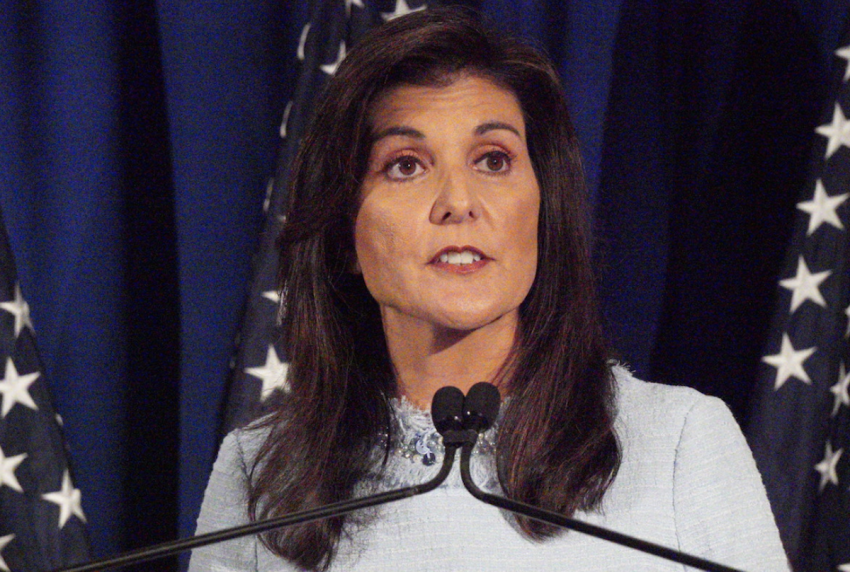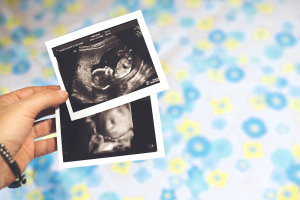Nikki Haley says she can lead America to national consensus on abortion

ARLINGTON, Va. — Republican presidential candidate Nikki Haley is billing herself as the person who can forge a national consensus on abortion, citing her experience creating a consensus around another highly contentious debate during her tenure as governor of South Carolina.
Haley, who formerly served as governor of South Carolina and United States Ambassador to the United Nations during the Trump administration, gave a speech on abortion before a crowd of pro-life activists at the headquarters of Susan B. Anthony Pro-Life America on Tuesday. In her speech, Haley expressed a desire to “start a constructive conversation about where we go from here in our divided country.”
Abortion has become a major campaign issue ahead of the 2024 presidential election, as Republican candidates debate how to address the issue following the U.S. Supreme Court’s decision in Dobbs v. Jackson Women’s Health Organization determining that the U.S. Constitution does not contain a right to abortion. The Dobbs decision, handed down last year, has given states the ability to regulate abortion.
Since the Dobbs ruling reversed the Roe v. Wade decision that legalized abortion nationwide, data compiled by Susan B. Anthony Pro-Life America shows that 15 states have established total or near-total bans on abortion, similar laws in five additional states are tied up in court, and one state will soon enact a law banning abortions after six weeks gestation and another state has a 15-week abortion ban in effect.
Meanwhile, the pro-abortion Guttmacher Institute has documented that 17 states and Washington, D.C., allow abortion. Four of those states and the nation's capital allow abortions up to the point of birth, while the other 13 permit abortions until viability, referring to the point in pregnancy where a baby has the ability to survive outside of the womb.
Haley touted her record of signing pro-life legislation when she was governor of South Carolina, including a Born-Alive Infant Protection Act, which protects babies who survived botched abortions, and “a law protecting unborn babies from the moment they could feel pain.” She explained that “as a state legislator, I voted for every pro-life bill that came before me” including a measure that “made it easier for women to get ultrasounds” and established a 24-hour waiting period for abortions.
“My goal as president will be the same as it was when I was governor and ambassador. I want to save as many lives and help as many moms as possible,” she proclaimed. Noting that the Dobbs decision enabled the American people to “forge consensus once again” on the issue of abortion, Haley stressed the need for the next president to “find national consensus” in order to meet the goal of “saving as many lives as possible.”
Haley acknowledged that “the pro-life laws that have passed in strongly Republican states will not be approved at the federal level,” condemning the “Democrat fear-mongers” for warning that “Republicans are about to ban all abortions nationwide and send women to prison.” She outlined some areas where she thinks the federal government and the American people can find consensus on the issue of abortion.
“There is broad public agreement that babies born during a failed abortion deserve to live. They need medical attention and the full protection of the law just like every other baby,” she said. “There is broad political agreement that we should never pressure moms into having an abortion. They should get support to carry their baby to term, they should be able to get information from pregnancy resource centers and especially about adoption.”
Haley added, “We must do better when it comes to adoption to make it easier for adoptive parents and to avoid children growing up in a government system with too little love.”
She further asserted that “pro-life doctors and nurses should never be forced to violate their beliefs” by performing or participating in abortions. “The right of conscience matters just as much as the right to life.”
Haley identified the beliefs that “abortion up until the time of birth is a bridge too far,” that “contraception should be more available, not less” and that “women who get abortions should not be jailed” as ideas that should become part of a national consensus on abortion.
She also cited her handling of the removal of the Confederate flag from the South Carolina State House after the 2015 mass shooting at the predominantly African American Mother Emanuel Church in Charleston where a gunman killed nine Christians during a Bible study as proof of her ability to create a consensus on a contentious issue: “In the awful days that followed, photos emerged of the killer posing with the Confederate flag. Amid our grief, a massive debate broke out. It centered on the Confederate flag that flew on the grounds of the South Carolina State House.”
Haley detailed how “our state had been bitterly divided on the flag for decades” with one side viewing it as a symbol of “traditions that are noble” in addition to “heritage” and “ancestry” and the other side seeing it as a “deeply offensive symbol of a brutally oppressive past.” Haley gave a speech shortly after the massacre, where she called for the removal of the Confederate flag from the State House grounds.
“This was no easy task. It was a highly emotional issue in our state and removal required two-thirds vote of both the State House and Senate. But several days later, large, diverse and bipartisan majorities in our state Legislature voted to bring the flag down. We found consensus on a very tough issue. Republicans and Democrats worked together and made progress by talking to each other as human beings. We saw past our differences and united to move forward as one state and one people.”
The Republican-controlled South Carolina House of Representatives voted to remove the Confederate flag in a 93-27 vote three weeks after the massacre, with a majority of the chamber’s Republicans voting with all Democrats in favor of bringing the flag down. The Republican-controlled South Carolina Senate gave near-unanimous approval for taking down the flag in a 37-3 vote, with a majority of Republicans and all Democrats voting in favor.
“What was true then with the flag can be true now with abortion,” she concluded. “This shouldn’t be about one movement winning and another one losing. This shouldn’t be about picking sides, scoring points or stoking outrage. It’s about saving babies and supporting moms. I’m fighting for all of them and I will work with anyone to do that. I have faith we can make progress, I have faith we can save more lives and give every baby, mother and family the best shot at the best life.”
Haley finished her speech by likening the challenges faced by the pro-life movement to the obstacles experienced by abolitionists and women’s suffrage advocates as they fought on behalf of the causes that they found noble.
Throughout her address, the candidate advised advocates on both sides of the debate to treat the “deeply personal topic” of abortion with “sensitivity and respect” as opposed to “judgment and hate.” She illustrated her husband Michael’s “personal” connection to the issue of abortion.
“Michael’s birth parents lived in poverty. His father was an alcoholic and in and out of prison. His mother suffered a traumatic brain injury. When he was just a few years old, Michael and his siblings were taken from their home. Later, they were put into foster care. It was a rough experience for him,” she recalled. “Thankfully, when he was 4 years old, a loving family adopted Michael and his younger sister. It changed their lives. Adoption literally saved them.”
She added: “Every day is a blessing because someone gave him life. Every day is a blessing because a family loved and raised him under difficult conditions. The world is better because of Michael Haley. I often think about what would have happened if Michael had not been so blessed, if his biological mother had chosen a different path.”
“My husband is reason No. 1 that I stand for life. Every day I get to spend with the love of my life reminds me that I am blessed that someone saved his life.”
Haley also told the story of a friend who was raped: “I know the anguish she went through worrying that she would have an unwanted pregnancy. It was an anguish I wouldn’t wish on anyone. We can’t ignore the fears those women face. I will never downplay these difficulties as I fight for life and I won’t demonize those who disagree with me.”
Haley’s speech comes less than a week after former President Donald Trump, the current frontrunner for the Republican Party’s presidential nomination, drew ire from Susan B. Anthony Pro-Life America after his campaign suggested that abortion should be left up to individual states to decide and that Republicans should not pursue federal legislation on the matter.
In a statement, SBA Pro-Life America President Marjorie Dannenfelser described that assertion as “a morally indefensible position for a pro-life candidate to hold.”
“Life is a matter of human rights, not states’ rights. Saying that the issue should only be decided at the states is an endorsement of abortion up until the moment of birth, even brutal late-term abortions in states like California, Illinois, New York and New Jersey. The only way to save these children is through federal protections, such as a 15-week federal minimum standard when the unborn child can feel excruciating pain,” she added.
Dannenfelser vowed to “oppose any presidential candidate who refuses to embrace, at a minimum, a 15-week federal minimum standard to stop painful late-term abortions while allowing states to enact further protections.” While Haley pushed for federal government action on the issue of abortion, she did not explicitly call for a national 15-week abortion ban.
Following Haley’s speech, Dannenfelser reacted positively to Haley’s remarks in a statement shared with The Christian Post, expressing gratitude to the candidate for “sharing her vision for a pro-life America” and insisting that she “understands that as a nation we must build a national consensus to save as many lives and serve as many women as possible.”
“We are clear on Ambassador Haley’s commitment to acting on the American consensus against late-term abortion by protecting unborn children by at least 15 weeks when they can feel excruciating pain. We appreciate her leadership on this defining moment for human rights, and we urge every presidential candidate to share their vision moving forward,” Dannenfelser continued.
The current RealClearPolitics average of polls measuring voter preferences in the Republican Party presidential primaries, based on polls conducted from March 29 to April 24, shows Haley capturing 3.9% support, coming in at fourth place on a list of declared and potential candidates. Currently, Trump has 52.4% support among Republican primary voters, followed by likely contender and Florida Gov. Ron DeSantis at 23.4% and former Vice President Mike Pence, another potential candidate who has 4.3%.
Ryan Foley is a reporter for The Christian Post. He can be reached at: ryan.foley@christianpost.com



























